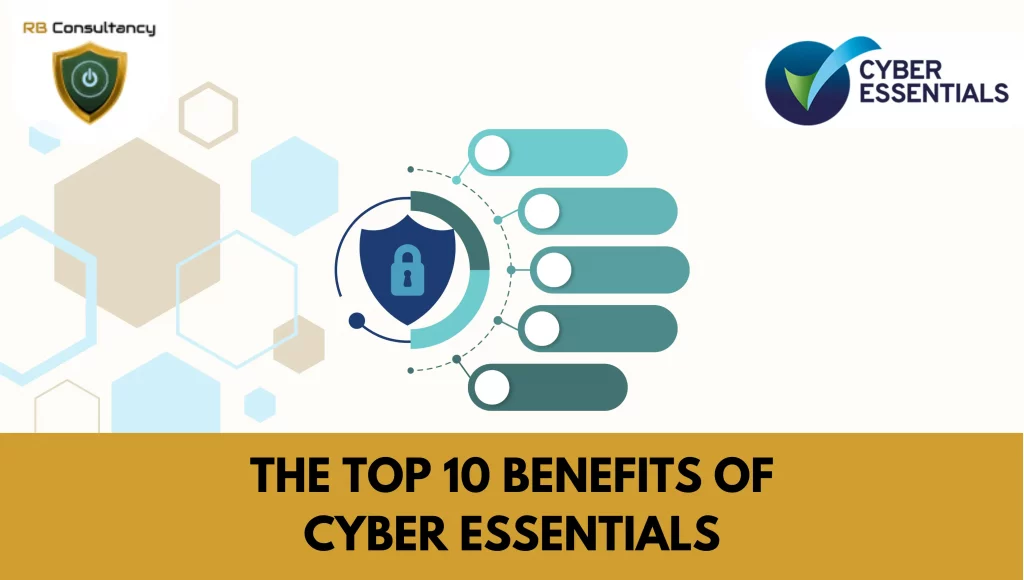Introduction
Cyber Essentials is a UK government-backed annual certification scheme that helps organisations protect against common cyber threats. It provides a clear framework for securing devices, networks, and data. By implementing five key technical controls – relating to firewalls, secure configuration, security updates, access control, and malware protection – organisations can significantly reduce cyber risk and demonstrate commitment to cyber security.
Cyber Essentials is suitable for organisations of all sizes and can be mandatory for some, based on supply chain requirements and/or insurance purposes. With many cyber-attacks relying on techniques and weaknesses that are well known, organisations can implement a small number of controls to give protection against many internet-based attacks. By protecting personal data through technical controls, organisations can also help demonstrate compliance with the UK Data Protection Act 2018.
In this article, we explore the top 10 benefits of the Cyber Essentials scheme, reference a case study, review its impact, and consider how it might relate to the Cyber Security and Resilience Bill.
Cyber Essentials Explained
- A UK government-backed cyber security scheme with annual certification
- Requirements set by the National Cyber Security Centre (NCSC)
- A verified self-assessment that consists of ~90 questions
- Based on the implementation of five key technical controls
- Firewalls – to ensure only secure and necessary network services can be accessed from the internet
- Secure Configuration – to ensure computers and network devices are properly configured
- Security updates – to ensure devices and software are not vulnerable to known security issues for which fixes are available
- User Access Control – to ensure user accounts are assigned to individuals and provide access to only those applications, computers and networks that the user needs to carry out their role
- Malware Protection – to restrict the execution of known malware and untrusted software
Top 10 Benefits of Cyber Essentials
1- Protection against most common forms of cyber-attack
Research from insurers show that organisations with Cyber Essentials certification are 92% less likely to make a claim on the cyber insurance than those without it. This helps show the effectiveness of the scheme and how the technical controls can reduce risk.
2- Enhanced supply chain security
The National Cyber Security Centre (NCSC) see an increasing number of attacks through supply chain vulnerabilities – if organisations insist on Cyber Essentials certification within their supply chain, there should be a greater (supply chain) security posture and a reduction in risk. St. James Place (major financial services organisation in UK) is a good example of where Cyber Essentials in the supply chain can reduce risk (see relatable case study below).
3- Ability to bid for contracts
Many contracts, funding opportunities, and grants now require Cyber Essentials. In October 2024, many of the UK’s largest banks pledged to incorporate Cyber Essentials within their supplier requirements.
4- Compliance and Data Protection
Cyber Essentials can help organisations comply with the UK Data Protection Act 2018, by ensuring personal data is protected against unauthorised access.
5- More informed
88% of organisations involved in the Cyber Essentials impact survey believe Cyber Essentials has improved their understanding of cyber security risk.
6- More competitive
69% of organisations involved in the Cyber Essentials impact survey believe that it has increased their competitiveness in market.
7- Free Cyber Insurance
Eligible organisations can opt in for free cyber insurance with a £25,000 limit of indemnity. Organisations can call the 24-hour helpline to report incidents, receive incident response services, and access crisis management support.
8- Supports the Cyber Security and Resilience Bill
Is expected to be introduced to Parliament in 2025. The policy paper was updated in April 2025 and sets out a requirement to strengthen supply chain security. Based on the proven success of Cyber Essentials, the certification may be a key leverage for organisations to demonstrate appropriate levels of security within their supply chain.
9- Support for UK Cyber Resilience
With many UK-based organisations reporting impact from cyber attacks and the benefits of Cyber Essentials being proven over time, the mass adoption of Cyber Essentials could be a way to increase the UK’s overall cyber resilience.
10- Demonstrates commitment to cyber security practices
By achieving Cyber Essentials certification, organisations can demonstrate their commitment to cybersecurity. This can also build trust with customers, suppliers, and stakeholders. Additionally, the Cyber Essentials impact survey shows 88% of organisations that achieved certification would recommend it to others.
Relatable Case Study
- Organisation: St. James’s Place (Financial Service Sector)
- Challenge: faced with evolving cyber threats, St. James’s Place needed to strengthen its cyber hygiene across its network of 2,800 independent advisors
- Solution: They adopted Cyber Essentials to establish a baseline of security across their partnership network
- Impact: The certification helped reduce vulnerabilities, improve client trust, and support compliance with regulatory expectations, with around an 80% reduction in cyber security incidents
- Source: https://iasme.co.uk/articles/wealth-management-firm-st-jamess-place-mandates-cyber-essentials-plus-across-network-of-partner-organisations/

How We Help
At RB Consultancy Ltd, we support organisations by:
- Providing templates, guidance, and experience to support
- Explaining what security measures are available and how they can help
- Collaborating to implement controls to support the requirements
- Assessing and issuing certifications – such as Cyber Essentials and Cyber Assurance
- Contact us for consultancy and certification support
Conclusion
Cyber Essentials offers a robust framework for organisations to enhance their cybersecurity posture. By implementing the five key technical controls, organisations can significantly reduce the risk associated with cyber-attacks and demonstrate their commitment to data protection.
The scheme supports compliance with the UK Data Protection Act 2018 and enhances trust with customers, suppliers, and stakeholders. The potential for free cyber insurance and the ability to bid for contracts make it an increasingly sought-after investment. As cyber threats continue to evolve, adopting Cyber Essentials can be a strategic move to safeguard organisational data and assets – it also supports the broader goal of enhancing the UK’s overall cyber resilience.
RB Consultancy Ltd helps organisations with Cyber Essentials – we support the implementation of appropriate measures to help build cyber resilience and carry out regular assessments. We are an IASME Certification Body and NCSC Assured Service Provider who provide services to empower and protect organisations. Holding CISSP and ISO 27001 lead implementer certification, you can Contact Us for assistance with cyber security resilience.
This blog is written by Remo Belisari, Managing Director of RB Consultancy Ltd. He is an experienced cyber security professional and cyber advisor. Remo holds certifications in CISSP, ISSAP, ISO 27001, Cyber Essentials, and IASME Cyber Assurance. He has many years of experience in IT and cybersecurity. He has supported organisations worldwide. His work includes helping a Fortune 500 company in the USA and over 100 organisations across the UK. The views in this blog are his own. They do not necessarily reflect the views of RB Consultancy Ltd, its clients, partners, or affiliates. The content is for general information only.

